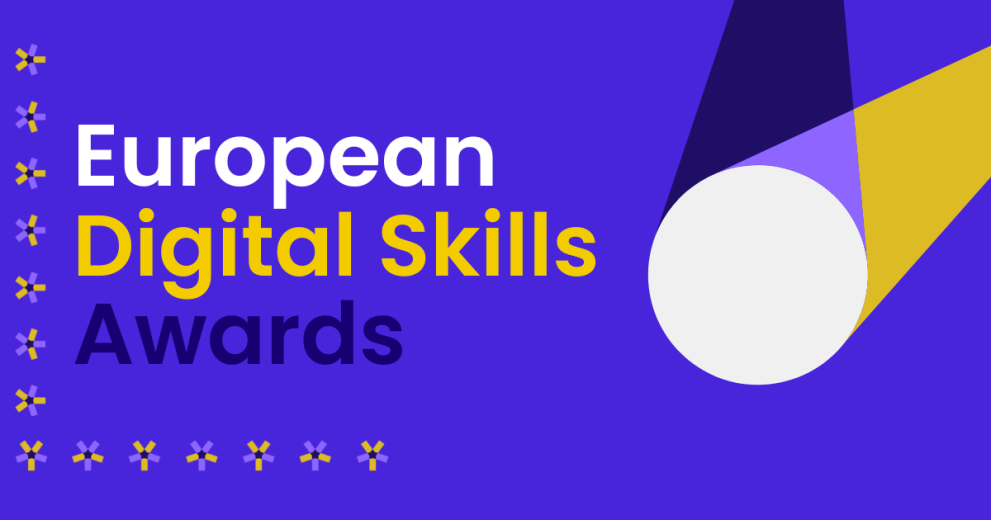European Digital Skills Awards: discover the past editions

The European Digital Skills Awards were organised for the first time in 2016 and were followed by two more editions, in 2017 and 2018. The National Coalition for Skills and Jobs has organised the prestigious event until this year's edition: in 2023 the Digital Skills and Jobs Platform is running the awards, always in collaboration with the European Commission and the National Coalitions for Skills and Jobs all around Europe. The applications for this year's edition are open until 8 April 2023, so make sure you consult the EDSA23 dedicated section if you would like to apply!
To find out more about the previous editions and the winning projects, we have compiled the list of projects and initiatives that have been awarded the prestigious European Digital Skills Awards. Some of the projects -most in fact- are still running and continue to produce an impact, empowering Europeans of all ages and walks of life to acquire digital skills, while some projects are not active anymore.
EDSA 2016
The first edition of the European Digital Skills Awards opened 4 categories for applications:
- Digital skills for all
- Digital skills for the labour force
- More and better trained ICT professionals in Europe
- Digital skills in education
The winners of the first EDSA were:
Digital skills for all: #SuperCoders, Belgium, France, Italy, Poland, Romania and Spain
#SuperCoders is a programme organized by Orange Group to introduce coding to children aged 9 to 13. By the end of 2016, the programme, which has been running since 2014, will have reached more than 6.000 children in 17 European and African countries. Free coding workshops are taking place in different countries throughout the year, facilitated by volunteer Orange coaches and partner associations.
Digital skills for the labour force: Growth Engine for Europe, all 28 EU Member States
Growth Engine for Europe is Google's program designed to help individuals and businesses succeed online. The digital skills training program is delivered through both online and offline training in all 28 Member States. Digital Workshop, an online learning platform, provides each visitor with a plan that is specifically tailored to the gaps in their knowledge and desired learning pace. The Growth Engine skills offline programs address local economical and societal challenges through the development of partnerships within local ecosystems and with multiple levels of government.
More and better trained ICT professionals in Europe: PROMPT – Professional Master in Software Engineering, Sweden
PROMPT is an educational initiative in cooperation with several academic parties and leading industrial companies and organizations. Together the parties develop advanced level courses in web-based format, tailored to fit professional engineers and software developers who need to be able to combine work and studies. The courses combine conventional studies with distance, web-based learning and seminars at campus or at the participating companies. The long-term goal of PROMPT is to guarantee the supply of advanced software competencies and innovativeness in industry.
Digital skills in education : Coding camp for economically disadvantaged children, Hungary
Elisabeth camps are organised yearly during the summer vacation for economically disadvantaged children in three different premises in Hungary: at lake Balaton in Zánka and Fonyód and in Transsylvania, in Ivó. The camps are financed by the Elisabeth programme of the Hungarian government. The parents of the participating children contribute to the camp only with a symbolic fee. As part of the Elisabeth programme, the ICT Association of Hungary (IVSZ) organised a one-week coding camp in July 2016 for 75 8-12 year olds. A further 150 children took part in this coding camp during a day visit. For all summer camps IVSZ organised a one-day digital skills workshops.
Learn more about the finalists and the EDSA 2016 edition.
EDSA 2017
The following year, the categories were widened with the addition of one dedicated to digital skills for girls and women:
- Digital skills for all
- Digital skills for the labour force
- Digital Skills for ICT professionals
- Digital skills in education
- Digital skills for girls and women
The winners in the 2017 edition were:
Digital skills for all: Digital skills for all: Digitaal.Talent@Gent – Unlocking the Digital Potential of all Citizens, Belgium
Digitaal.Talent@Gent is the e-inclusion programme of the City of Ghent, the Public Centre for Social Welfare Ghent and Digipolis Ghent, which aims to give all citizens the opportunity to develop digital skills. Digitaal.Talent@Gent reaches over 20,000 citizens a year in actions such as: the Digital lending service, where organisations and schools can borrow free hardware; a coding summer camp for underprivileged children and teens; a programme for people with intellectual disabilities who learn how to work with computers, ICT and deal with social media; an initiative where vulnerable families are introduced to educational games to support the transition of their children to primary school; a public library with digi-cafés for digital starters, digi-tastings where participants gain insight into digital themes such as social media, the cloud and the internet.
Digital skills for the labour force: Fit4coding - training jobseekers into web developers, Luxembourg
Fit4coding is a coding school run by a public-private partnership between NumericALL and the Ministry of Labour and Employment of Luxembourg. The programme aims to improve the digital skills of the country's workforce, while providing opportunities for young adults who have not gone through formal superior education. The duration of the programme is two years and aims to train 90 people by the end of 2017, in six cycles. The result of the first four cycles show that 80% of the students have found a job in development related positions in less than six months after the training.
Digital Skills for ICT professionals: Developer Scholarships Challenge in the EU
The Developer Scholarships Challenge Developer Scholarships Challenge is an initiative by Google, Bertelsmann and Udacity, to help close the ICT specialist skills gap in Europe and offer opportunities to everyone to change career or get access to the skills needed to be part of the new digital economy. During the course, each student is paired with a mentor to guide and support them through the coursework and app challenges. Out of 11,250 students enrolled in the Beginners Course, 6,405 completed it giving a 57% graduation rate. 12% of the Beginners said that they found a job / started app-based business / started freelancing. One of the goals of this scholarship programme is to help promote diversity in the field of technology.
Digital skills in education - Opening Opportunities in Romania
Opening Opportunities is a mentor-lead programme, in which IT professionals mentor teams of high school students who discover computer science, product development and team work in poor regions in Romania. The project includes training for mentors as well as students and showcasing technology in public spaces such as libraries. At the end of the mentoring period, seven teams are selected by a jury and the finalists pitch their computer science projects in Bucharest. The project is run by Asociatia Techsoup with the support of Microsoft YouthSpark and in partnership with Microsoft Romania and the National Association of Librarians and Public Libraries.
Digital skills for girls and women - IT for SHE in Poland
IT for SHE is a programme which aims to increase the participation of women in the high tech industry, by helping talented female students from IT faculties to enter the labour market. There are three main actions of the programme. The first is the Women in Tech Campwhere the 130 best IT female students in Poland take part in a hackathon, workshops and mentoring. The second action is the Kids in IT, where 50 volunteer female students from IT departments teach 1,000 kids in rural areas basic coding, how to usie 3D printers, Arduino programming and robot building. The third element is the Mentoring Program for female IT students, which is run by representatives of technology companies in Poland. The selected women get to work with mentors for six months on their professional and personal development.
EDSA 2018
In 2018 the applicants could choose between 5 categories:
- Digital skills for all
- Digital skills for the labour force
- Digital Skills for ICT professionals
- Digital skills in education
- Digital skills for girls and women
And the winners were....
Digital skills for all: Digital Senior (Norway)
Comment of the Jury: The winning project managed by the Norwegian Red Cross puts the spotlight on the part of our society that needs to catch up most in digital skills – the older generation. It brings digital skills to 'seniors' that have almost no digital experience when it comes to the use of everyday technology. After 10 weeks of training the participants can master a tablet, can use and understand email, camera, video chats as well as two apps of their own choice.
Digital skills for the labour force – Coding Bootcamp Praha (Czech Republic)
Comment of the Jury: The winning initiative supports people who are motivated to change their careers from traditional businesses to IT. This bootcamp offers coding education focused on web development. The quality of the training programme is ensured by an industry-tested curriculum, learning by doing, and solving real-world problems. The programme is also unique because it offers a "Job Guarantee" scheme. 90% of graduates successfully land a relevant industry job within two months upon their graduation.
Digital Skills for ICT professionals - Data analytics learning framework at Airbus (France, Germany, Spain, UK)
Comment of the Jury: This project is a solution for one of the biggest challenges going forward: re-training the current workforce. It includes all functions across the entire company – also non-tech ones, such as human resources and finance, and it includes subsidiaries of SME size. The learning framework relies on both digital and community learning, which allows flexibility for each participant to learn and leverages on the collective intelligence of the group of trainees. Senior management, notably the Digital Transformation Officer and Human Resources of Airbus, provide an important support to this initiative.
Digital skills in education – Lie Detectors (EU-wide)
Comment of the Jury: This project is an original NGO initiative, which tackles the important issue of digital disinformation. It prepares school children aged 10-15 to become powerful critical thinkers. It also empowers teachers to build their confidence in addressing the issue of digital news literacy. More particularly, the project associates various stakeholders and brings together journalists, teachers and students. Journalists receive training to deliver interactive sessions in classrooms to the children and to provide further teaching material to teachers. The project is already active in Belgium and Germany, and very soon in Austria, with quite a lot of interest expressed by other countries.
Digital skills for girls and women - #Hackeuses (France)
Comment of the Jury: This initiative embodies several criteria important to the jury. It’s an organization that is pan-European and it takes advantage of both national and European funding to pursue and develop its mission. It’s a female effort focused and therefore representing a key best practice in increasing participation of girls and women in the digital economy. Additionally, the initiative is multi-generational and therefore also engages women with work and life experience whose leadership is critical for building an inclusive and sustainable, digital society.
The 5 winners and the 19 remaining shortlisted finalists got a chance to pitch their projects at ICT2018 and meet Europe’s tech community.
Find more information in the page of the European Digital Skills Awards 2018.


